Ukraine crisis: Fierce fighting after Minsk peace deal
- Published
News of the peace deal spread to soldiers on the front line, says the BBC's Ian Pannell
Intense fighting has been reported in eastern Ukraine, a day after a peace deal was reached in Minsk.
The fiercest battles were over control of the town of Debaltseve, a strategic town in between rebel-held areas.
The group responsible for monitoring the ceasefire, due to start at midnight on Saturday, says there is still "quite serious live fire" in several areas.
European leaders have warned Russia that it faces additional sanctions if the Minsk agreement is not respected.
BBC journalists in Donetsk heard new shelling on Friday morning while Russian TV said Luhansk also came under bombardment overnight.
But Ukraine's army said the most ferocious fighting centred on Debaltseve, a railway junction where rebels have besieged government troops in a last-ditch effort to win the town.
"The enemy continues to build up forces in the main areas of the armed conflict. The most tense situation is near Debaltseve," military spokesman Andriy Lysenko told reporters.
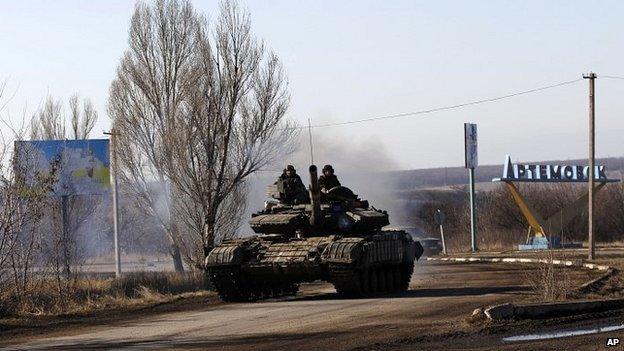
Ukrainian troops rumbled towards the town of Debaltseve on Friday where fighting continues to rage
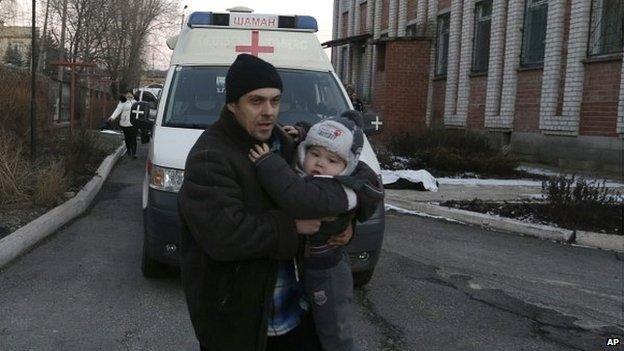
A rocket killed a young child near a school in Artemivsk, a government-held town near Debaltseve
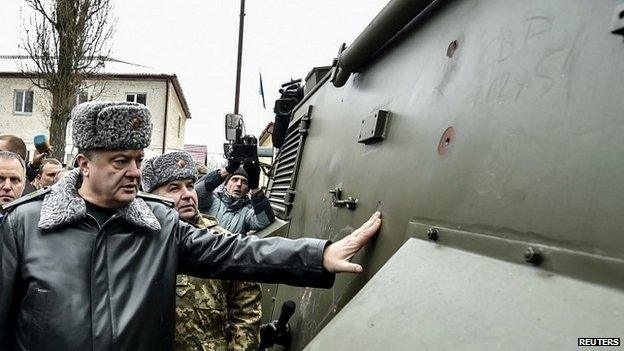
President Poroshenko said there was "a long way to go to peace" while visiting a training base on Friday
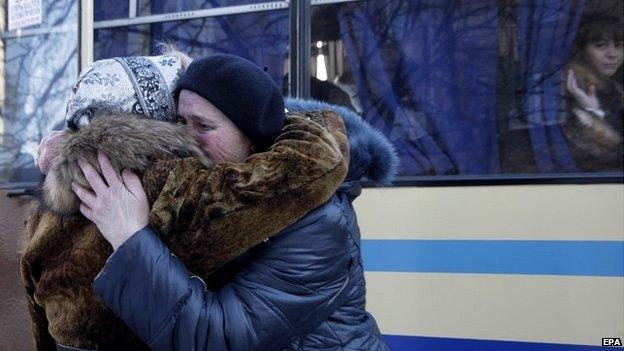
Women embrace as they wait for a bus, carrying evacuees to Russia, to leave Donetsk
On Friday, the Ukrainian military said eleven soldiers had died and 40 more wounded in the previous 24 hours, while rebels said seven civilians had been killed.
Earlier, two more people died when rebels shelled a cafe in Shchastya, near Luhansk, according to the head of the Kiev-controlled regional administration.
A young child was also reported to have been killed when a rocket landed near a school in Artemivsk, a large government-held town near Debaltseve.
The new clashes came amid wider doubts about the peace deal agreed following marathon negotiations between the leaders of Russia, Ukraine, Germany and France.
Troop movements
Michael Bociurkiw, spokesman for the OSCE monitoring group, said they were hopeful the deal would be fully implemented, but said things on the ground remained very turbulent.
"We feel that the Minsk agreements are really the only available roadmap to a sustainable ceasefire. But now unfortunately... there's quite serious live fire in areas like Luhansk, Debaltseve," he said.
He also said monitors had witnessed "significant movements" of unmarked military vehicles and convoys.
Pro-Russian rebels signed the peace agreement but key issues remain to be settled - and Ukrainian President Petro Poroshenko warned that implementation would be difficult.
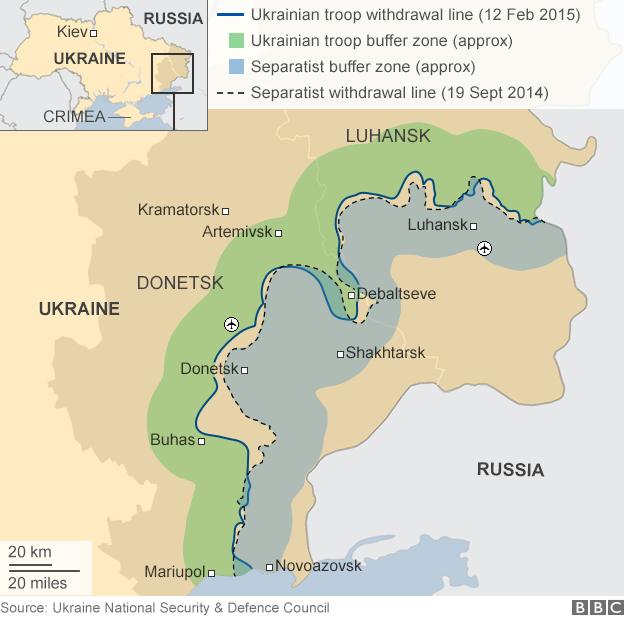
A new round of EU asset freezes and travel bans against 19 Ukrainian separatists and Russians - in response to deadly fighting in the city of Mariupol in January - will come into effect on Monday regardless of the latest deal.
'Glimmer of hope'
But German Chancellor Angela Merkel says wider measures, including further sanctions on Russia, could be implemented if the ceasefire is not upheld.
She has called the deal "a glimmer of hope", adding: "It is very important that words are followed by actions."
Ukraine and the West accuse Russia of supplying weapons and personnel to the rebels but Russia denies this.
It reaffirmed that denial on Friday, with Kremlin spokesman Dmitry Peskov insisting it could only be a "guarantor" because it played no direct role in the conflict.
"[Russia] is not a party that has to take action in this matter. We simply cannot do that physically, because Russia is not a participant in this conflict," he said.
Ceasefire to begin at 00:01 local time on 15 February (22:01 GMT 14 February)
Heavy weapons to be withdrawn, beginning on 16 February and completed in two weeks - beyond a buffer zone behind the current front line for Ukrainian forces and behind the September front line for separatist forces
All prisoners to be released; amnesty for those involved in fighting
Withdrawal of all foreign troops and weapons from Ukrainian territory. Disarmament of all illegal groups
Ukraine to allow resumption of normal life in rebel areas, by lifting restrictions
Constitutional reform to enable decentralisation for rebel regions by the end of 2015
Ukraine to control border with Russia if conditions met by the end of 2015
Ukraine conflict
The human cost
5,486
people killed since conflict began in April 2014
-
12,972 wounded across eastern Ukraine
-
5.2 million people estimated to be living in conflict areas
-
978,482 internally displaced people within Ukraine, including 119,832 children
The truce will be monitored by the OSCE - but with only 412 international monitors in Ukraine, external, some analysts have expressed doubt that they are there in adequate numbers to do the job.
Few in Donetsk expect a sudden and complete end to war, says the BBC's James Reynolds who is there.
Officials say more than 5,400 people have been killed since the conflict began, but the UN believes the actual death toll to be much higher.
There has been a dramatic rise in casualties in recent days, with 263 civilians killed in populated areas between 31 January and 5 February.

Correction 12 May 2015: This story has been amended to replace an inaccurate map.